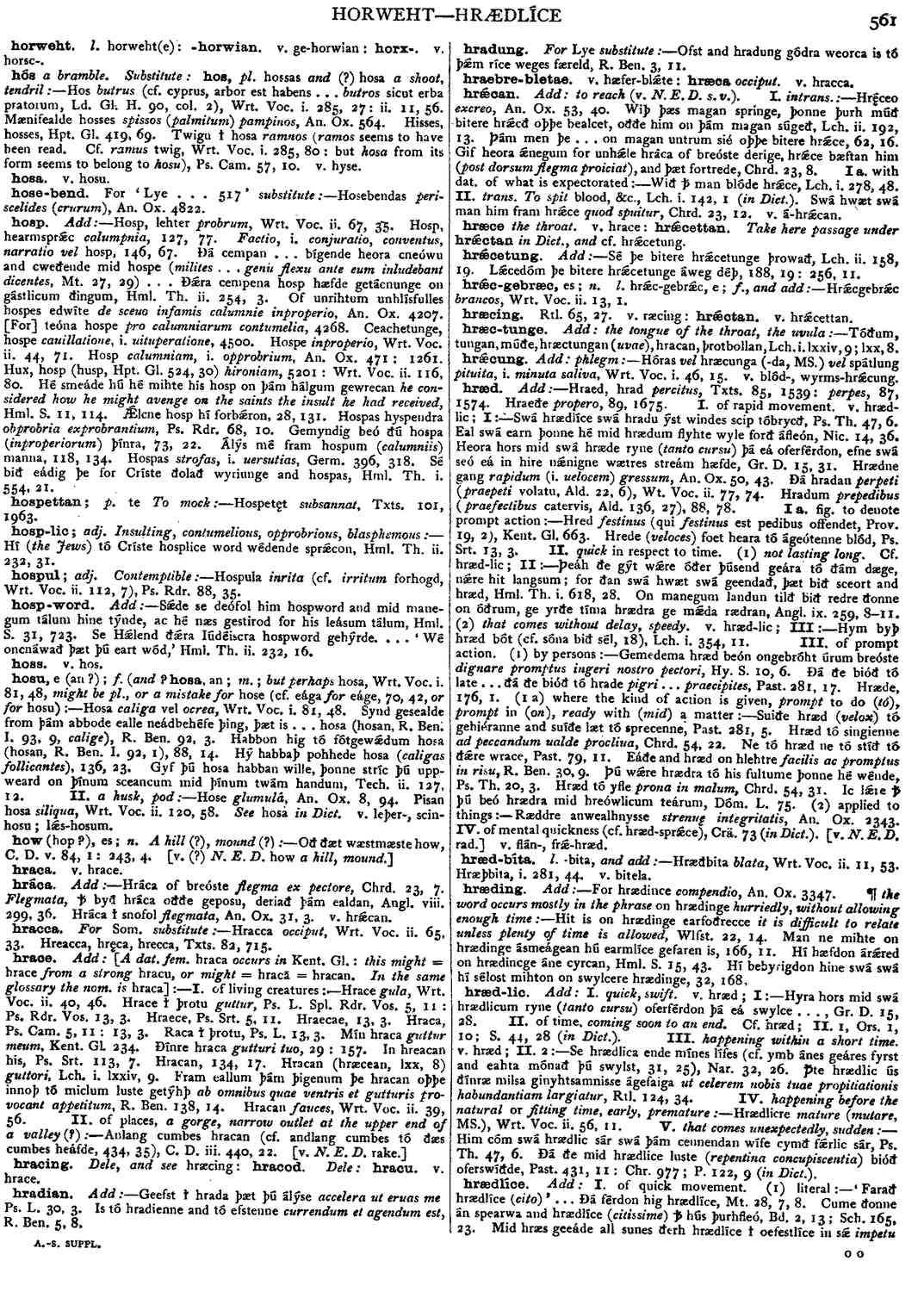hrædlíce
- adverb
-
'Farað hrædlíce (
cito
)' . . . Ðá férdon hig hrædlíce,- Mt. 28, 7, 8.
-
Cume ðonne án spearwa and hrædlíce (
citissime
) ꝥ hús þurhfleó,- Bd. 2, 13; Sch. 165, 23.
-
Mid hræs geeáde all sunes ðerh hrædlíce ł oefestlíce in sǽ
impetu abiit totus grex per praeceps in mare,
- Mt. L. 8, 32.
-
Árís hræðlíce
surge velociter,
- Rtl. 58, 9.
-
Hreód wrít[eres] hreðlíce wrítendes,
- Ps. Srt. 44, 2.
-
Hrædlíce cursum (l. cursim, v. Ald. 202, 15,
cursim
festinat credere Christo),- Wrt. Voc. ii. 96, 15.
-
Hrædlíce naviter (qui laboriosi certaminis coronam viribus
naviter
nanciscuntur,- Ald. 2, 17), Wrt. Voc. ii. 74, 58.
-
Hræd[líce]
quantotius,
- An. Ox. 56, 321: B. 963.
-
Ðá ætsóc hé . . . And hrædlíce (
continuo) þá creów se cocc (immediately the cock crew ),
- Mt. 26, 74.
-
Hrædlíce
confestim,
- 21, 3.
-
Úp ásprung[n]um leóman hrædlíce geondgeótað
exorto iubare extimplo diffundunt,
- An. Ox. 89.
- Rædlíce, 3676.
-
Hé him word onsende, þurh þæt hí hrædlíce hǽlde wǽron,
- Ps. Th. 106, 19.
-
Hwearf hé þá hrædlíce,
- B. 356.
-
Arís nú hrædlíce,
- An. 938: 1507: El. 1087.
-
Nis hit him nó swá longe áléfed swá þé ðyncþ, ac ðú miht ongitan ꝥ him biþ swíþe hrædlíce gestýred hiora orsorgnesse,
- Bt. 38, 2; F. 196, 23: C. D. iv. 87, 11: Ll. Th. i. 334, 35: Bl. H. 107, 14.
-
Gehýr mé hrædlíce and mé help freme
velociter exaudi me,
- Ps. Th. 68, 17: 142, 6: Cri. 263.
-
Hredlíce,
- Ps. Srt. 36, 2.
-
Tídlícor, hrædlícor maturius (ut disputatio
maturius
terminetur,- Ald. 77, 29), Wrt. Voc. ii. 55, 24.
-
Uton habban úre mód úp swá swá wé yfemest mægen wið ðæs heán hrófes þæs héhstan andgites ꝥ þú mæge hrædlícost cumon tó þínre ágenre cýððe,
- Bt. 41, 5; F. 254, 17.
-
Ðæt gé nó tó hrædlíce ne sién ástyrede from gewitte
ut non cito moveamini a vestro sensu,
- Past. 213, 16: 220, 12.
-
Míne sǽlþa . . . náne sǽlþa ne sint, for ðám hí swá hrædlíce gewítaþ,
- Bt. 10; F. 26, 28: Bl. H. 21, 11.
-
Manige men lustlíce gehýraþ, and þeáh hrædlíce forgytaþ,
- 55, 26.
-
Ne hádige man ǽfre wudewan tó hrædlíce,
- Ll. Th. i. 416, 16.
-
Hý wǽron gebrytte swá hrædlíce swá swá hradu ýst windes scip tóbrycð,
- Ps. Th. 47, 6.
-
Be þám æfteran is hrædlíce tó witanne
de secundo breuiter intimandum est,
- Bd. 4, 23; Sch. 469, 13.
-
And þæt ic hrædlíce cweðe
ut enim breuiter dicam,
- 5, 8; Sch. 587, 13: 5, 12; Sch. 612, 15.
-
Fǽringa, hrædlíce
inprovisu,
- Wrt. Voc. ii. 45, 41.
-
Hú hrædlíce se fǽrlica deáð hié bereáfode . . . Ðeáh hí hit hrædlíce ætsomne ne gestriéndon
quibus festina mors repente et simul abstulit, quidquid eorum nequitia nec simul nec repente congregavit,
- Past. 332, 16-18.
-
Hrædlíce perniciter (catechumeni cadaver, quem fortunae ferocitas
perniciter
oppresserat (cf. hé swá fǽrlíce swealt,- Hml. Th. ii. 504, 25), Ald. 30, 26), 78, 79.
Bosworth, Joseph. “hrædlíce.” In An Anglo-Saxon Dictionary Online, edited by Thomas Northcote Toller, Christ Sean, and Ondřej Tichy. Prague: Faculty of Arts, Charles University, 2014. https://bosworthtoller.com/53087.
Checked: 0